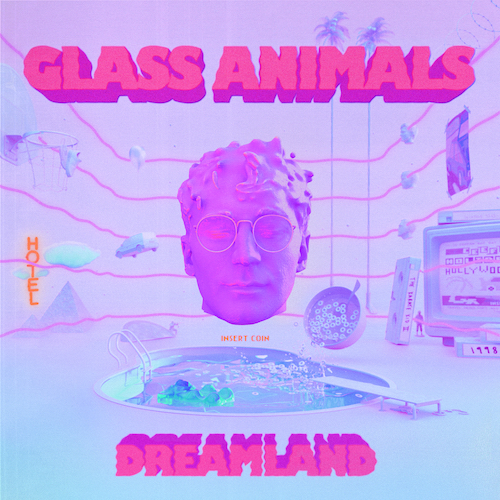
Glass Animals - Dreamland
Whether or not you are familiar with Glass Animals and their music, their third studio album Dreamland is a must listen. Following up a concept album focused mainly around the stories of others in How to Be a Human Being (HTBAHB), Dreamland is in contrast completely focused around the past experiences of lead singer Dave Bailey. This album serves as a triumph of Glass Animals’ ability to adapt to some of the more mainstream genres of today, while still staying true to their usual sound that fans originally fell in love with. In a reality consumed by a global pandemic and other social issues, Dreamland provides us with a much needed escape.
One of the best qualities about Glass Animals is their ability to set the mood and sound for their albums. Their previous releases, Zaba and HTBAHB, which are certainly topics for other reviews, perfectly set the mood for the story they want to tell. This is also the case for Dreamland, as the opening title track “Dreamland” is a masterful way to start this album. It is easy to find yourself lost in their desired dreamland even from the first few notes. Add on Bailey’s angelic vocals and you’re immediately sent into his world of dreams.
In a world where pop and hip hop dominate the music scene, Glass Animals made a bold attempt to incorporate some of these elements into their own music throughout Dreamland. This risk definitely paid off, and leads to a solid album that is full of musical elements from several different genres. “Tangerine” is one such example of adding modern pop influences into their music, straying from something that may be heard on either Zaba or HTBAHB, and definitely succeeds as a catchy earworm. Even more successful is their incorporation of hip-hop to their usual groovy, yet complex sound. The results are the funky and head bobbing “Space Ghost Coast to Coast,” speaking to a childhood friend Bailey once had who later attempted a school shooting. “Tokyo Drifting” featuring Denzel Curry is probably the best and most welcome example of this new sound, and while Curry’s verse in the song is rather short, it is easily one of the highlights of the album.
Unfortunately this success isn’t carried out perfectly, as “Hot Sugar” is easily one of the weakest tracks on the album. The song severely lacks lyrical complexity, and the incorporated pop elements lead to a pretty underwhelming sound. Even though “Waterfalls Coming Out Your Mouth,” suffers from the same issue of being lyrically weak (“Cheap booze, Pepsi blue, You got bottles in from 2002,” etc.), it is musically a much stronger tune, and one you can always find yourself coming back to.
One of the more unique parts of Dreamland are the audio clips of home movies from Bailey’s childhood sprinkled throughout the album. Not only do they serve as little intermissions between sections of songs, but hearing a young Bailey’s discussion with his mother about rockets is a very welcome and heartwarming bonus. “Melon and the Coconut” seems to serve a similar purpose. The stories of a relationship between a Melon and a Coconut is intriguing enough, but the simplicity of this song and out of tune guitar twangs make this a strangely addicting listen.
Even with their attempt at a more modernized album, Glass Animals do manage to keep some nuggets of their older sound sprinkled throughout. “Your Love (Déjà Vu)” is a direct throwback to the sounds of Zaba, where the constant thumping of the bass in the background combined with the funky synthetic licks lead to an understandably jammy tune.
Despite Glass Animals’ success throughout the album, two songs definitely stand out the most. The buildup of sound and emotions on “It’s All So Incredibly Loud” is masterfully done, and is some of Bailey’s best lyrical work. The entirety of the song captures three seconds of real time passing after having told somebody something that will undoubtedly hurt them, and how the following silence feels like the loudest thing in the world. You are then rewarded after all of the tension and build up with a powerful conclusion that only leaves you wanting more. If you were to take away only one song from this album it would have to be “Heat Waves”. This song is an absolute bop and will have you hitting the repeat button over and over. There is an immediate curiosity introduced with the muffled sounds of Bailey’s vocals and a quiet guitar riff, but then you get hit with an immense wave of synth-driven sound that sends shivers down your spine. This track really compliments Bailey’s vocals and lyrical genius, the whole song being a metaphor for changing who you are for someone else without even realising. Bailey teaches us that it’s okay to be defeated by something, and to accept your vulnerabilities. Not only has this song become one of the most played Glass Animals songs, but it also made it onto the soundtrack for FIFA 21. It’s about time these guys get the recognition they deserve.
In the end did they succeed with the overall concept of this album? Absolutely. Bailey’s lyrics elicit that good feeling of nostalgia and their instrumental display leaves you uncontrollably bopping your head. Even some of their smaller themes scattered throughout the album were well placed and very deep, revealing some of the issues that Bailey faced in his childhood. Dreamland hosts some of Glass Animal’s best musical work, and they ultimately succeeded in making another amazing album.